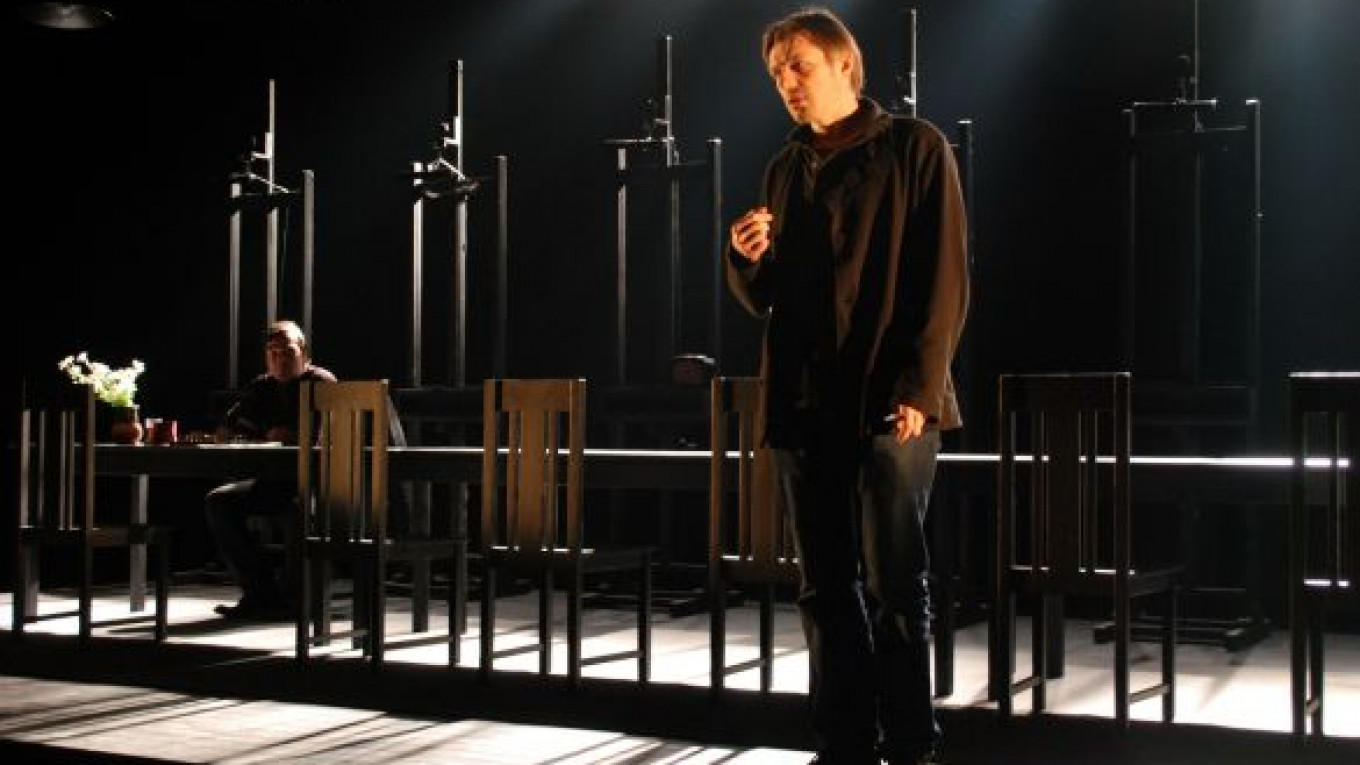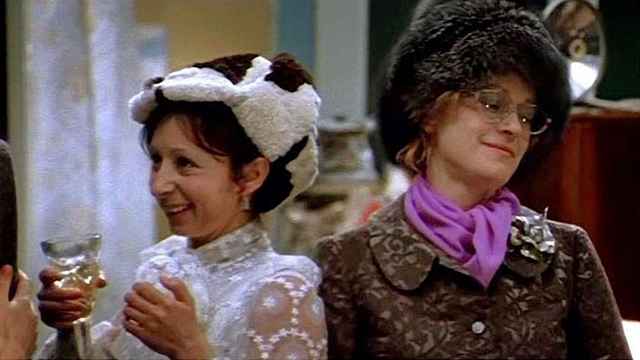I can't decide whether I thought the 2009-10 theater season was long and protracted, or whether it whizzed by in a flash. What I do know is this: It now, indeed, is over. Let's take a rest. But before we do, let's take a moment to remember those moments we shouldn't forget.
Drum roll, please. Here they are, the 18th annual Moscow Times theater awards.
Trend: Back to the Present. The deeper we wade into the rising waters of the 21st century, the closer we come to the mores and problems of the 19th century. Several productions this season tackled topics of wealth, power, corruption, ignorance and the exploitation of women that were originally treated in plays written over a century ago. Lo and behold, they looked like they were written last week! "Mad Money" at the Pushkin Theater, "Money" at the Satirikon and "The Gentleman" at the Sovremennik were just three shows that skewered the foibles of the present by reaching back to the art of the past.
New Kid on the Block, Male: This will sound odd to opera lovers, but the winner is 26-year-old Vasily Barkhatov. His bold, inventive production of Friedrich Schiller's "The Robbers" at the affiliate of the Pushkin Theater was his first foray into drama after winning fame with memorable opera productions at the Mariinsky Theater in St. Petersburg.
New Kid on the Block, Female: Anastasia Pronina as Natasha in Yaroslava Pulinovich's "Natasha's Dream" at the Playwright and Director Center. Pronina was still a first-year student at the theater institute when director Georg Genoux plucked her out of obscurity for this role of a troubled teenage girl. It fit her like a glove.
Most Delightful Surprise: "The Gentleman" at the Sovremennik. This forgotten play written by Alexander Sumbatov-Yuzhin in 1897 sprang to life under the direction of Yevgeny Kamenkovich, in the design of Pavel Kaplevich, and with the superb performances of 14 actors. Rediscoveries like this are the spice of any theater season. Bravo all!
Most Welcome Guest: Yanina Lakoba in Valery Fokin's production of Vadim Levanov's "Ksenia" for the Alexandrinsky Theater of St. Petersburg. This show played Moscow just once, as part of the Golden Mask Festival in the spring, but I still remain moved by Lakoba's sensitive, tough performance of the Russian Saint Ksenia of St. Petersburg.
Defiant Designer: Nikolai Roshchin, who with his set for "[bokh]" at the ARTO Theater threw down a gauntlet before his audience like one rarely sees. In this production about people being prisoners of ignorance and fate, Roshchin not only locked his actors in a mesh cage, he imprisoned the spectators too. If you wanted to leave the hall, you were asked to raise your hand and the theater promised to stop the performance to let you out.
Designer of Opulence: Pavel Kaplevich for "The Gentleman." His spectacular costumes in styles from the 16th to the 21st century, coupled with his exotic set of a luxurious interior, set the stage for a gorgeous production. This was eye candy of the highest degree.
Best New Play: "Natasha's Dream" by Yaroslava Pulinovich. This portrait of a teenage orphan caught up in violence is unmistakably the work of a young author — Pulinovich is 22. But it bears the marks of individuality, vision and talent. Keep an eye on this writer.
Gold Digger Nonpareil: Alexandra Ursulyak turned in one of the most affecting performances of the year as the money-hunting, man-using Lidia in Roman Kozak's production of Alexander Ostrovsky's "Mad Money" at the Pushkin Theater. Ursulyak was funny, bewitching and utterly merciless in her quest for affluence and influence.
Understated Brilliance: Ilya Isayev was almost invisible for much of "A Stalemate Lasts But a Moment" at the National Youth Theater. Playing a father whose children are methodically eliminated by the Nazis, he was so quiet and subdued that you might have thought he wasn't there. But when his character stepped out of the shadows to confront evil, you suddenly realized what extraordinary power the actor had put into his deceptively mild manner.
Tough as Steel, Built to Crumble: Sergei Chonishvili in Bulgarian director Yavor Gardev's production of Jordi Galceran's "The Gronholm Method" at the Theater of Nations. Chonishvili turned in a brilliant performance as Fernando, one of four candidates competing in a strange group interview for a high-powered corporate position. His Fernando was sharp, haughty, witty and impervious to attack. At least he was until he melted into a puddle of vulnerability and pain when the real rules of the interview were revealed.
Most Memorable Episode: Yelena Anisimova in Viktor Rozov's "Alive Forever" at the Russian Army Theater. She essentially had one scene in an otherwise unremarkable production, but her side-splitting turn as a party-crasher is still with me three months after I witnessed it. Konstantin Stanislavsky said there are no small roles, just small actors. He was right. A big actor makes a small role big.
Indescribable: "Tararabumbia," directed by Dmitry Krymov and composed by Alexander Bakshi for the School of Dramatic Art. It is defined as a "parade" or "procession" of characters drawn from, or inspired by, the plays of Anton Chekhov. But is it drama? It's not opera. What is it? Spellbinding is what it was.
Pretty as a Picture: Madlen Dzhabrailova in Pyotr Fomenko's "Triptych" at the Fomenko Studio. She played the jaunty, bawdy Laura in "The Stone Guest," Alexander Pushkin's treatment of the Don Juan myth, and she did it as though she had stepped down from a rich, voluptuous medieval painting.
Marvelously Mismatched: Igor Gordin and Yelena Lyamina as the ill-fated couple in Irina Keruchenko's dramatization of Fyodor Dostoevsky's story "The Meek One" at the Theater Yunogo Zritelya. She was sensitive and flighty; he was rational and small-minded. It made for a disaster of a marriage, but a riveting evening of theater.
Speaking Out: Mikhail Ugarov's production of "One Hour Eighteen" at Teatr.doc. This documentary account of the death in prison last November of attorney Sergei Magnitsky upped the ante of social protest in the arts. Ugarov and his cast stood up and spoke their mind in a way no one around them has dared.
Best Production: I love problems like this — I can't decide. And so I grant the prize jointly to two exquisite shows: "A Stalemate Lasts But a Moment" at the National Youth Theater, and "The Gronholm Method" at the Theater of Nations. Both were directed and designed with taste, clarity and bite. Both were acted with brilliance. The twin peaks of the season.
Best Director: Mindaugas Karbauskis, "A Stalemate Lasts But a Moment." He took the harrowing theme of a family being destroyed by the Holocaust and presented it with beauty, understatement, gentleness, subtlety and humor. Oh yes, and he slammed you in the gut. At the conclusion of the performance that I attended, everybody, but everybody, was weeping. Wow.
Man of the Year: This is easy: Anton Chekhov. Who would have guessed that this man was born 160 years ago and died 106 years ago? Not I, if all I relied upon were this year's marquees. Chekhov was omnipresent, lending his name to festivals and appearing as a character in plays, while productions of his plays and stories were mounted left and right.
A Message from The Moscow Times:
Dear readers,
We are facing unprecedented challenges. Russia's Prosecutor General's Office has designated The Moscow Times as an "undesirable" organization, criminalizing our work and putting our staff at risk of prosecution. This follows our earlier unjust labeling as a "foreign agent."
These actions are direct attempts to silence independent journalism in Russia. The authorities claim our work "discredits the decisions of the Russian leadership." We see things differently: we strive to provide accurate, unbiased reporting on Russia.
We, the journalists of The Moscow Times, refuse to be silenced. But to continue our work, we need your help.
Your support, no matter how small, makes a world of difference. If you can, please support us monthly starting from just $2. It's quick to set up, and every contribution makes a significant impact.
By supporting The Moscow Times, you're defending open, independent journalism in the face of repression. Thank you for standing with us.
Remind me later.







